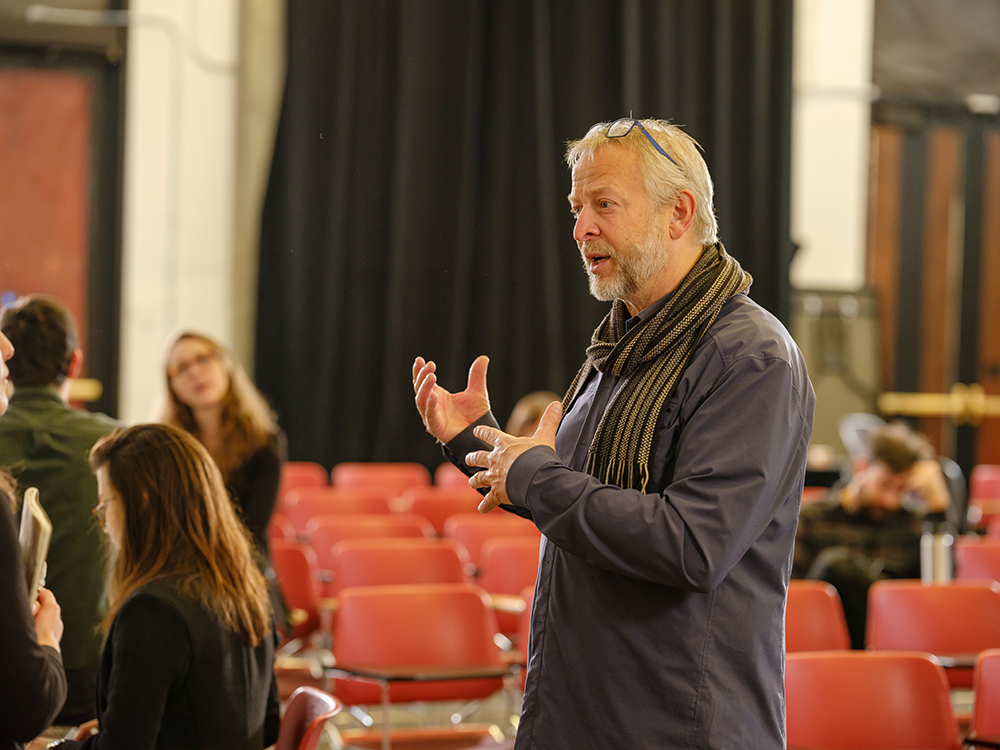Jeff Schnabel named director of Portland State University School of Architecture
Professor Jeff Schnabel, who was promoted to full professor in May, has been named director of the School of Architecture at Portland State University in Portland, Oregon. Schnabel will assume the directorship on September 1, 2019, succeeding Professor Clive Knights, who is stepping down to rejoin the School’s faculty after more than 12 years of distinguished leadership.
Co-founder of the Portland Winter Light Festival and a longtime member of the Willamette Light Brigade, Schnabel is a leader in the discipline of light and projected media as a method of transforming the built environment. He holds a Master of Architecture from University of Pennsylvania, and a Bachelor of Science/Landscape Architecture from West Virginia University.
“Jeff Schnabel is an exceptional leader and designer who has demonstrated his commitment to the ideal of making beautiful, functional, sustainable architecture for the benefit of all, while earning countless kudos from his students. I am thrilled to welcome Jeff as director of the School of Architecture,” said Leroy Bynum, Dean of the College of the Arts.
“He has an extraordinary example to follow; in my years working with Clive Knights, I have been consistently impressed by his leadership, his devotion to the educational needs of architecture students, and his tireless dedication to building a unique architectural program of the highest quality,” said Dean Bynum.
Since joining the PSU School of Architecture faculty, Schnabel organized the symposium “Illuminated City” in 2011, which attracted light artists and designers who worked with Schnabel to create the Portland Winter Light Festival. Schnabel spearheaded the effort to expand the festival to the PSU campus in 2019. He is vice president of the Willamette Light Brigade, a nonprofit organization that lights Portland’s bridges. He is a member of the New York-based Nighttime Design Institute and the Media Architecture Institute in Toronto.
In 2012, Schnabel established the Shattuck Hall Ecological Learning Plaza at the School of Architecture, an experimental space that was initially used to explore green roofs and green walls and is now a space dedicated to design-build projects and full-scale material explorations. With Rudy Barton, emeritus professor, he has led groups of architecture students on several trips to Spain (Madrid, Barcelona, and Girona), investigating and sketching contemporary and ancient architecture and public spaces in Spanish cities both large and small.
Schnabel teaches architecture studios, seminars, and introductory courses at both the graduate and undergraduate level, and has served as thesis advisor for Master of Architecture students since the inception of the degree in 2009.
“Clive Knights led the transformation of a modest program into a fully accredited school populated with a diverse faculty who bring their national and international reputations in service to our wonderful students,” said Schnabel. “I look forward to building on this momentum in support of our students, and furthering our engagement with Portland’s design and creative communities.”
During his 12 years at the helm, Clive Knights oversaw a series of significant developments in the School, including the establishment and accreditation of a professional Master of Architecture program (2-year and 3-year tracks), the founding of the Center for Public Interest Design, an internationally known research and action center, and the launch of the first Graduate Certificate in Public Interest Design in the United States. In addition, he led a major renovation of Shattuck Hall, the School of Architecture’s home on the PSU campus, which achieved LEED Gold certification. Knights will return to the School of Architecture faculty after a year-long sabbatical. Read Professor Knights’s letter to the student community here.
“It has been a remarkable journey, accompanied by talented and supportive faculty,” said Knights. “Jeff has been with us all the way and is the perfect person, not only to sustain the momentum of the school, but to bring a suite of new ideas that will enrich and augment the school’s offerings as well as its standing in the community going forward.”

 Study Architecture
Study Architecture  ProPEL
ProPEL 
